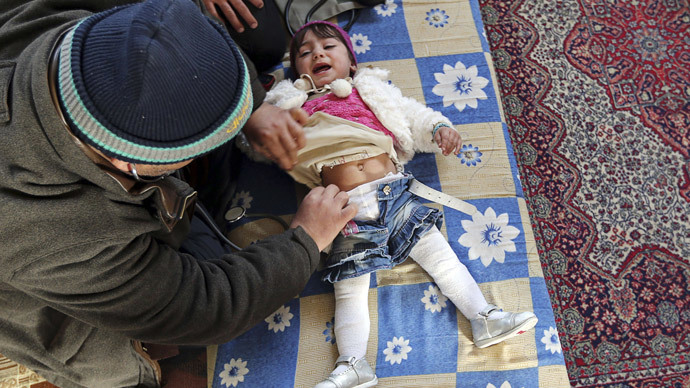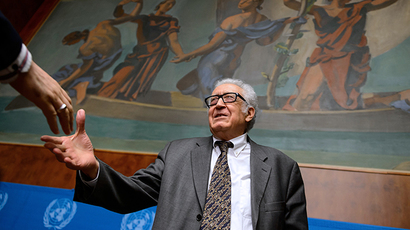‘Metal bar knockout instead of anesthesia’ – report details Syria healthcare collapse

The toll from the war in Syria has crushed the healthcare system, with a new report from Save the Children revealing that infants are dying in incubators from power cuts, limbs are being cut off due to lack of equipment, and polio cases are on the rise.
A 13-page report released on Monday describes the devastating transformation of Syria’s health system since the start of the war three years ago. The nation's healthcare went from “a middle-income country, with child survival statistics to match” to 60 percent of Syria's hospitals being damaged or destroyed and almost half the country’s doctors fleeing the country.
“Across Syria, 60 percent of hospitals and 38 percent of primary health facilities have been damaged or destroyed, and production of drugs has fallen by 70 percent. Nearly half of Syria’s doctors have fled the country: in Aleppo, a city which should have 2,500 doctors, only 36 remain,” the report said.
The impact the war has had on healthcare has been “horrific,” Save the Children states, as the remaining doctors are incapable of treating all those in need of medical assistance.
"Syria's health system is now in such disarray that we have heard reports of doctors using old clothes for bandages and patients opting to be knocked unconscious with metal bars, because there are no anesthetics," the report notes. "The lack of clean water means sterilization for bandages is nearly impossible, causing the threat of infection and possible death."

More than 100,000 people have died since the war began, according to UN estimates. “Children have witnessed and experienced extreme violence, and more than 10,000 young lives have been lost as a direct result,” the report states.
“It is not just the bullets and the shells that are killing and maiming children. They are also dying from the lack of basic medical care. Syria’s health system has been devastated.”
Save the Children estimates that several thousand children have died due to “greatly reduced access to treatment for life-threatening chronic diseases like cancer, epilepsy, asthma, diabetes, hypertension and kidney failure.”
The charity calls the situation more than a crisis, as the entire healthcare system and millions of lives are at risk.
Some of the most devastating impacts on medical care in Syria include “children having limbs amputated because the clinics they present to don’t have necessary equipment to treat them; newborn babies dying in their incubators due to power cuts; parents arriving at hospital to find no medical staff and hooking up children themselves to intravenous drips.”
Patients also died after receiving wrong blood types, and transfusions have sometimes been carried out directly between people due to a lack of power, according to the report.
A total of 200,000 Syrians are estimated to have died from chronic diseases due to lack of medical care, the report said, quoting data from the Syrian American Medical Society.
Meanwhile, those remaining in hospitals are facing daily threats. “Health workers, medical staff and patients, including children, have come under attack either en route to or inside medical facilities themselves. Homes are being used as makeshift hospitals, even turning living rooms into operating theatres.”
Risk of polio epidemic
Another concern for the country is the collapse of vaccine programs. Before the war began, vaccination coverage was at 91 percent. A year later, it fell to 68 percent, and now it is estimated to be much lower.
The lower number of vaccines has led to a rise in “deadly diseases like measles and meningitis,” which were almost unheard of before the war.

Medical experts fear a rise of the polio virus, which was eradicated in Syria in 1995 and has now infected up to 80,000 children across the country.
A surge of cases has increased concerns about the virus globally.
"Children born after 2010 have not been vaccinated for two years. There have been heavy restrictions in access to vaccines and health workers have not been able to reach children in need,” the report says.
In conclusion, Save the Children has urged access to all of Syria to provide “vaccines, food, water, medicines and other life-saving assistance.” The charity urged for health workers not to be targeted. It also proposed immediate investment and access to “child-focused heath services...to ensure that children are not dying from preventable and treatable injuries and illnesses.”














